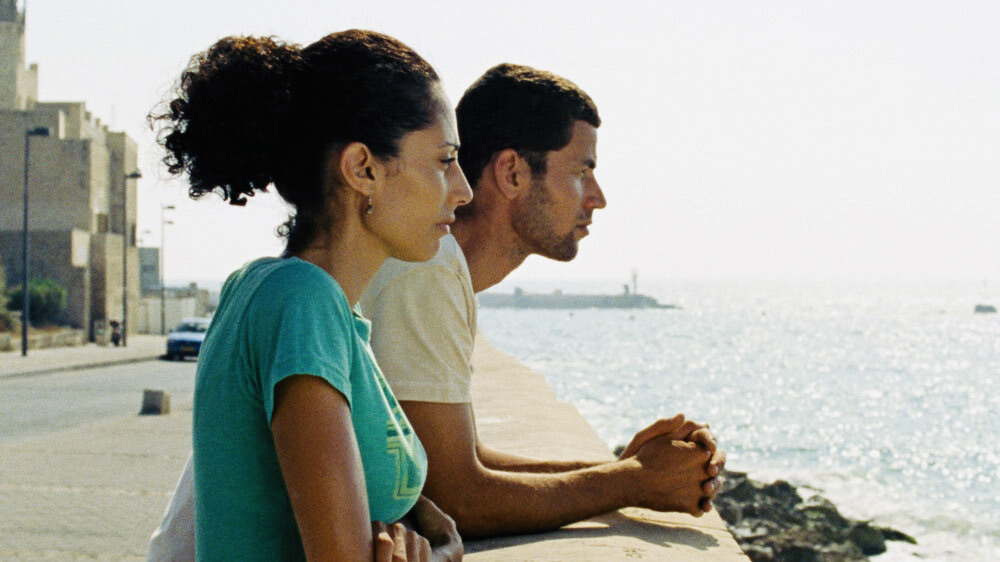Netflix is currently presenting an eclectic selection of Palestinian feature films and shorts under the rubric of Palestinian Stories. It’s a definite sign of the times, underscoring the strides the Palestinian cause has made in recent years.
I watched one feature-length movie, Salt Of This Sea, and two shorts, The Crossing and Ave Maria, all of which convey the sense of loss, homelessness, anger and humiliation felt by Palestinians, particularly in the Israeli-occupied West Bank and in the Gaza Strip, which is controlled by Hamas.
Like the films under review, Salt Of This Sea is directed by an ethnic Palestinian, Annemarie Jacir, and stars Palestinian actors. Though released for distribution in 2008, it is as relevant today as it was 13 years ago.
The opening scene, consisting of black-and-white archival footage of bulldozers flattening buildings, is stark and telling. It’s an indirect reference to the destruction of a Palestinian neighborhood or village decades ago, when Palestinians fled the newly-created state of Israel.
Suheir Hammad, a Palestinian American, portrays Soraya Tahani, a feisty woman from Brooklyn who dreams of visiting her ancestral homeland. When she arrives at Israel’s Ben-Gurion Airport, she is predictably grilled and her suitcase is thoroughly searched. As a Palestinian, she automatically comes under a cloud of suspicion, her U.S. passport notwithstanding.
Having received a two-week visa, she heads toward her first stop, Ramallah, the administrative headquarters of the Palestinian Authority in the West Bank.
Tahani’s first order of business is to gain access to her late grandfather’s frozen account at the British Palestine Bank, but much to her distress, she learns it is no longer valid. “There’s nothing to be done at this point,” says the manager briskly, offering to extend a loan.
Disappointed and frustrated, she leaves the bank. By chance, she meets Emad (Saleh Bakri), a waiter in a local restaurant. He introduces her to his family, whose hospitality is overflowing. Later, atop a hill on a clear day, he points toward Tel Aviv and Jaffa in the far distance.
As she gazes longingly toward these Israeli cities facing the Mediterranean Sea, she recalls her grandfather’s favorite places in Jaffa, where he lived until his expulsion during the 1948 nakba, the process by which Palestinians were displaced during the first Arab-Israeli war.
Emad muses he hasn’t visited the sea in 17 years because Israel refuses to grant him a permit. This is not Emad’s only source of bitterness. When they’re stopped on a road by an Israeli army jeep, Emad is ordered to remove his shirt and trousers to ensure he is not a suicide bomber concealing explosives. “Don’t worry, this is normal,” he tells Tahani nonchalantly.
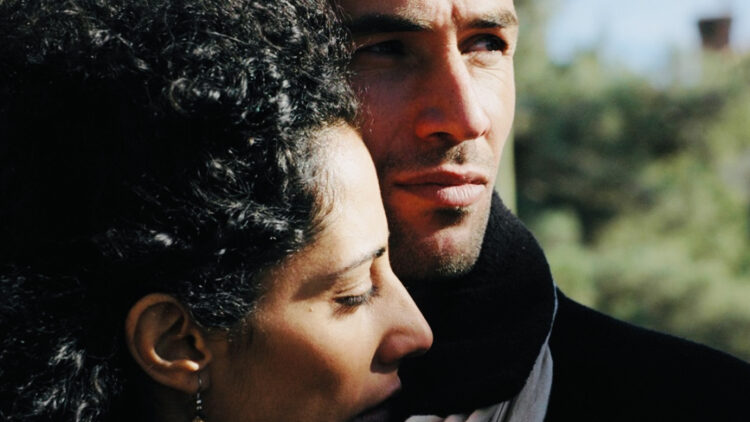
Emad, having received a scholarship from a university in Canada, is desperate to leave. “Life is better in other places,” he says in an oblique reference to the Israeli occupation and its attendant restrictions. “Palestine is not just Jaffa oranges.”
As the film proceeds, they drive along the ugly concrete security wall Israel built inside and outside its internationally-recognized borders. And then, in an implausible “Bonnie and Clyde” moment, Tahani and Emad rob the British Palestine Bank, making off in a car driven by their photographer friend, Marwan (Riyad Ideis).
In another scene which smacks of unreality, they clear Israeli roadblocks without a hitch and enter West Jerusalem. Wearing yarmulkes, Emad and Marwan implausibly try to pass as Jews. As they wander through its streets, they pause at two buildings which summon up memories of Jerusalem’s Arab heritage.
From Jerusalem, they drive to Jaffa, where they frolic in the sea. In Jaffa’s old quarter, Tahani is visibly touched by its weathered walls. Emad knocks on a door of a house and a hospitable young woman, an Israeli peacenik, invites them in. Assuming this was her grandfather’s residence, Tahani launches into a tirade.
Their next destination is Dawayima, a Palestinian village reduced to rubble during the 1948 war. A symbol of the nakba, it was attacked by Israeli forces on October 29 of that year and scores of its inhabitants were killed in what Palestinians describe as a massacre. During the 1950s, a moshav, Amatzia, was established on portions of its lands.
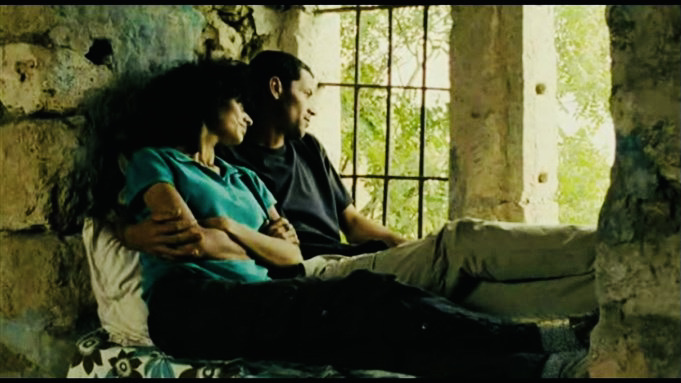
Tahani and Emad sleep overnight in the ruins of a building, behaving almost like lovers. The following morning, a Jewish guide informs Tahani that visitors are forbidden to camp in what is now a national park. The tense mood immediately dissolves when Tahani claims she’s Jewish. The implication couldn’t be clearer. If you’re a Palestinian, you don’t belong here.
As the film winds down, they’re arrested by a policeman after Emad fails to produce proof of his identity. What follows is predictable, if not sad.
Salt Of This Sea, with fine performances from Hammad and Bakri, distills the plight of Palestinians who have been traumatized by the nakba.
The Crossing, directed by Ameen Nayfeh, is a 10-minute short which speaks to Israel’s methods to control the movements of Palestinians in the West Bank.
A young Palestinian man named Shadi, having received an Israeli permit to visit his ailing grandfather whom he hasn’t seen in four years, is driven to a checkpoint. His sister and a friend accompany him. As they head toward their destination, they pass the high concrete barrier that divides some Palestinian neighborhoods in East Jerusalem.
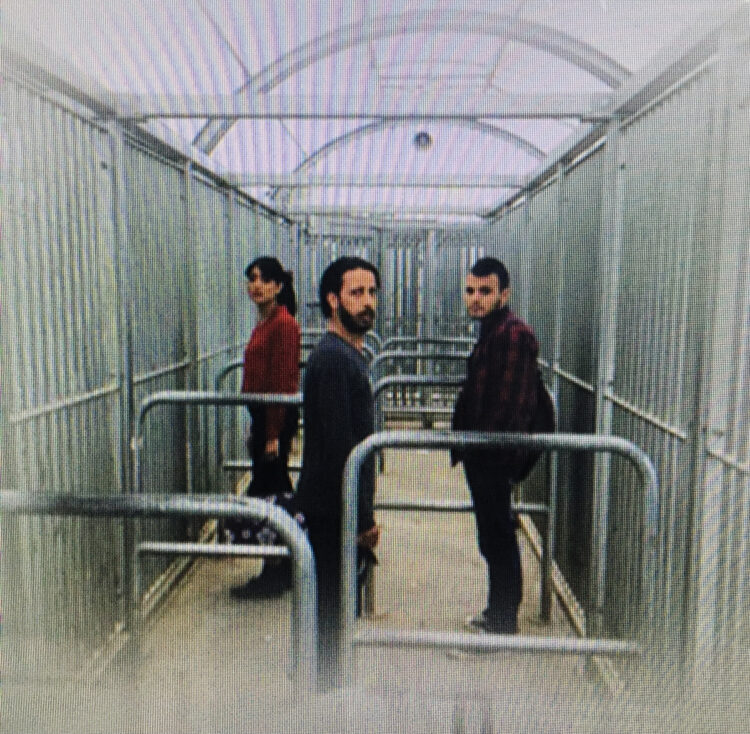
At the checkpoint, a Palestinian says he waited 40 minutes to get through, only to be rejected. They hear the same story from another man.
At first, Shadi receives the same cursory treatment from an Israeli attendant in a booth. “No entry,” he’s told. “Go back home.”
They’re allowed through only after Shadi lies about the condition of his grandfather. These are among the tricks that Palestinians resort to in order to gain freedom of movement.
Ave Maria, 14 minutes in length and directed by Basil Khalil, unfolds in a bleak stretch of the West Bank after Israeli Jews from a settlement accidentally crash into a statue of the Virgin Mary in front of a Palestinian convent.
Observing a vow of silence, the nuns do not initially react. Led by their mother superior, they approach the settlers, a religious couple and an elderly woman in a wheelchair. The man, a yarmulke on his head, hands over his pistol when asked to do so.
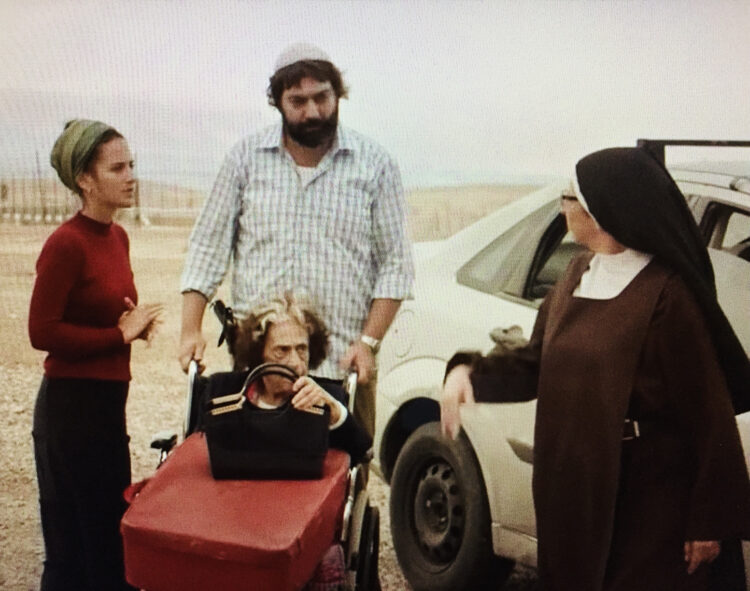
Since the sabbath is upon them, he asks a nun to dial the phone number of a taxi company for him. To his annoyance, the rate is beyond exorbitant. When he’s ready to pay, he learns that no Israeli driver wants to pick up a fare in “Arab territory.”
The man’s wife asks the nuns to notify the Israeli army, but nothing comes of that request. Instead, the nuns offer to loan the Israelis a rundown car if they return it the following day. The woman fears the “Arab car” they’ve been offered may cause a serious problem at their settlement.
Ave Maria leaves a mixed message. Israelis and Palestinians are capable of cooperating when necessary, but the image of Israelis that Khalil conveys is basically skewed. While the Israelis are armed and prickly, the Palestinians are kind and caring.
